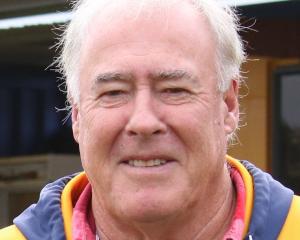The All Blacks v France. Cardiff. A Rugby World Cup quarterfinal. Bring back a few memories? It does for former Otago Daily Times rugby writer Hayden Meikle, who was there in 2007, when the world went black (well, blue). He recalls that night.
There has been a movement in social media this week to ask all and sundry where they went or what they did or how they reacted in the aftermath of THAT game eight years ago.
I can tell you exactly what I did to cheer myself up: I went to Passchendaele.
True story.
Like the rest of the New Zealand rugby writers whose World Cup had been cut unexpectedly short, I found myself at a bit of a loose end in Cardiff the day after the night before.
The plan was to head to Paris for two wonderful weeks, and dig deep into my book of cliches to describe the moment Richie McCaw - was he born in Oamaru or something? - lifted aloft the Webb Ellis Trophy.
Twenty years of hurt wiped out in one glorious campaign.
Then ... well, you know.
Those awful grey uniforms.
Carter injured.
Evans injured.
Luke McAlister sin-binned.
No drop goal attempt!
And something about a referee?
The boss rang the next day and said, ''Meiks, the good news is you can come home early. The bad news is the next available flight doesn't leave for five days.''
Passchendaele had been back in the news as Prime Minister Helen Clark had just visited the battleground in preparation for the 90th anniversary of our ''darkest day'', so it was decided I should go for a look, to cleanse the sour taste of a sporting defeat with a look at the site of an actual tragedy.
It's still hard to describe how I felt when I walked through Ypres, and visited the war museum, and wandered among the gravestones, many with ''Unknown Soldier'' etched on them, at Tyne Cot Cemetery. Just an utterly sobering experience.
But I digress.
It had been a strange week in Cardiff, the Invercargill of the north.
The city was grey and the local cuisine was utterly appalling but the beer tasted fine at the Angel Hotel, where All Black prop Keith Murdoch had famously got into a little strife in December 1972.
Inside the Millennium Stadium, wowzers.
What an extraordinary place.
A temple.
It became my favourite stadium, and would retain that status until Dunedin boldly, bizarrely built a $300million glasshouse.
Do I remember much about the quarterfinal?
Not a huge amount, to be honest.
It all seemed to happen so quickly.
But I do vividly recall people screaming ''drop goal'' in the last 10 minutes, and the groans as McAlister's sole attempt fell laughably short from a million miles away.
People crying, everywhere you looked.
The expressive French rugby writers jumping to their feet in delight at the final whistle, and thumping the press bench.
And an angry, obnoxious New Zealand television and radio personality, who had just arrived at the tournament and presumed he would be around for the glorious finish.
Seeing him with a thunderous look on his face cheered me up no end.
Two other memories stand out.
Anton Oliver, the Otago and All Black hooker, walking out to meet the media and uttering that incredible line about the ''smell of death''.
He copped some flak for that, which was disappointing.
He was hurting and he spoke from the heart, and Anton, of all people, would never have seriously equated rugby with a place like Passchendaele.
Finally, ringing a colleague back in Dunedin.
Tony was inconsolable.
Bad enough the All Blacks had lost - he had also signed a contract saying, if they lost, he would not watch an All Black test again until they won the damned trophy.
The truth is I haven't dwelt on that All Black loss for a second over the past eight years.
It was an extraordinary night, and I was privileged to be there.
And let's not underestimate France, eh?











